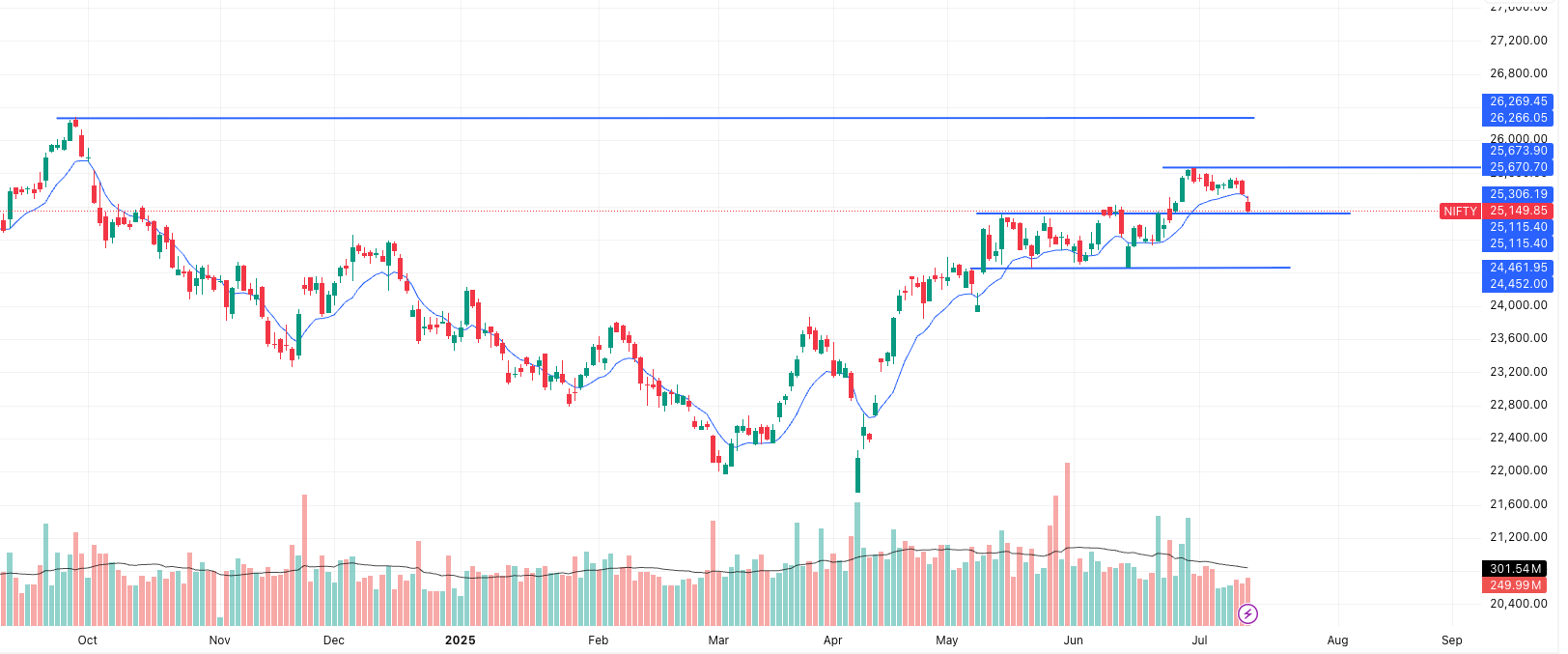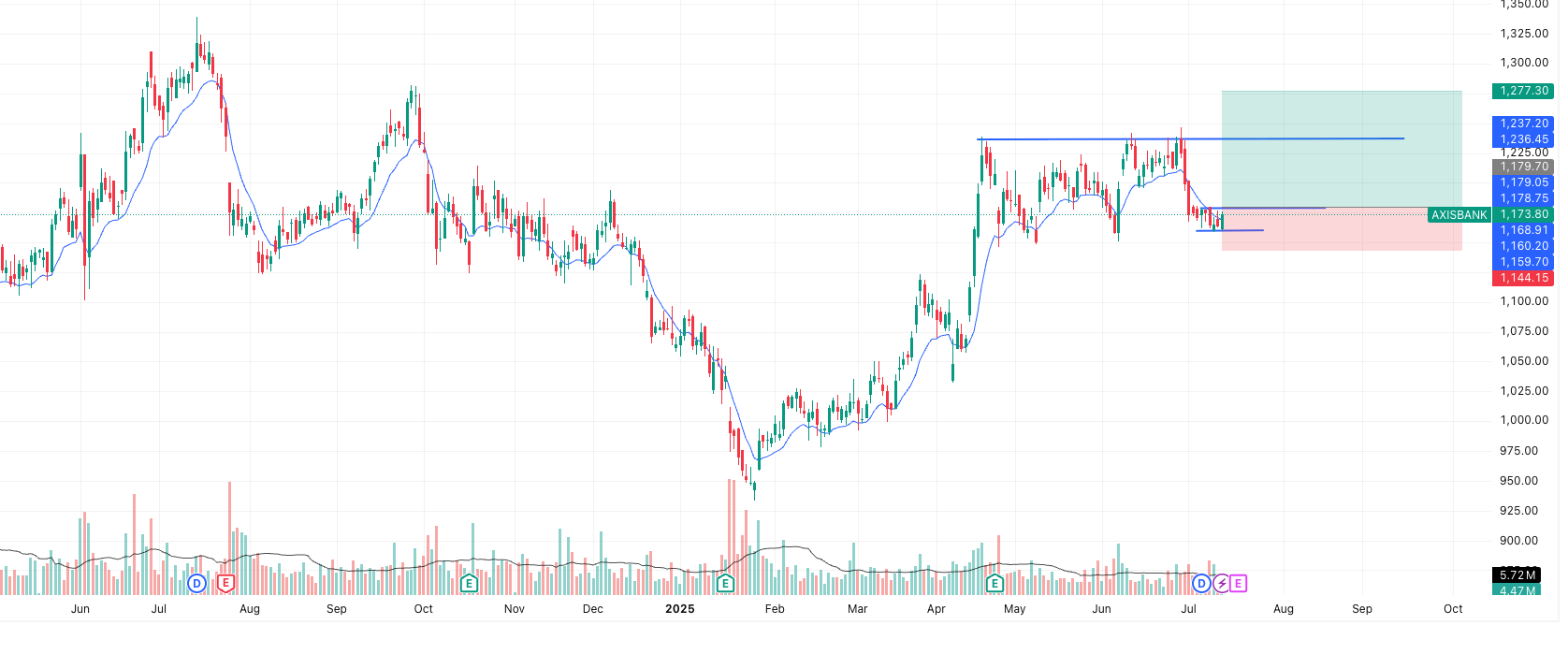What to Expect: Stock Market 14 July Outlook After Sharp Sell-Off
The stock Market 14 July is poised to open on a cautious note after a broad-based sell-off on the previous trading day, where key indices witnessed sharp declines. Nifty 50 ended 223 points lower at 25,132.10, while the Sensex dropped 737 points to close at 82,452.65.

High-beta sectors like IT and smallcaps took a major hit—Nifty IT tumbled nearly 2% and the BSE SmallCap index fell 0.81%, showing visible profit booking across riskier assets. Banking stocks also softened with the Nifty Bank slipping 0.42%, signaling investor caution ahead of key earnings and macro data releases.
In today’s newsletter, get a complete breakdown of technical levels for Nifty and trending stocks, in-depth stock-specific news, IPO updates, and our “Smallcap of the Day” idea to watch as markets reset.
Nifty Technical Outlook – stock Market 14 July
As we step into the stock Market 14 July, the sentiment remains cautious after Nifty 50 ended the previous session at ₹25,149.85, registering a sharp decline of 205.40 points or 0.81%. The index failed to hold above its key resistance and has now slipped below crucial support levels — a technical development that calls for vigilance in the sessions ahead.

False Breakout Turns Bearish
Nifty recently attempted a breakout above the ₹25,670 zone — its near-term resistance. However, this move proved unsustainable. The sharp reversal and close back below ₹25,115 confirm a false breakout, which often signals short-term weakness or a deeper correction.
Support Breach & EMA Breakdown
The index has also closed below its 9-day EMA of ₹25,306, a level that had been offering dynamic support during the past rally. Breaking this level adds further weight to the bearish tone. The immediate support zone around ₹25,115 has now been breached with volume, turning it into fresh resistance.
Volume Confirms Selling Pressure
The decline came with a notable spike in trading volume, confirming that the move was not a mere dip but likely a structural shift in the short-term trend. This further increases the odds of a continuation to the downside in the coming sessions.
Key Levels to Watch
| Zone | Price Range | Interpretation |
|---|---|---|
| Immediate Resistance | ₹25,300 – ₹25,670 | Selling zone unless broken with strength |
| Immediate Support | ₹25,115 | Broken — now resistance |
| Strong Support | ₹24,452 – ₹24,462 | Prior consolidation base; potential reversal zone |
| EMA (9) | ₹25,306 | Currently above price — indicates weakness |
Possible Scenarios Ahead
Bearish Case (More Likely)
If Nifty continues to trade below ₹25,115–₹25,150, a downward move toward ₹24,600, and eventually ₹24,460, appears likely.
Bullish Reversal (Less Likely for Now)
Only if Nifty closes back above ₹25,300 with strong volume would the structure regain bullish momentum and possibly retest the all-time high zone of ₹26,266–₹26,270.
Trading Plan: Swing Perspective
| Action | Level Range | Comment |
|---|---|---|
| Short Entry | ₹25,100 – ₹25,150 | Breakdown confirmed below key support |
| Target 1 | ₹24,600 | Intermediate support |
| Target 2 | ₹24,460 | Strong base support |
| Stop Loss (Short) | ₹25,350 | Above EMA & resistance zone |
| Long Entry (Reversal Only) | Above ₹25,350 | Requires strong close and volume confirmation |
Summary
The stock Market 14 July opens against the backdrop of a failed breakout, a breakdown below the 9 EMA, and rising bearish pressure. Until Nifty reclaims ₹25,300 decisively, traders may prefer a cautious or bearish stance, with eyes on the ₹24,600–₹24,460 support zone as the next potential area of interest.
News and Impacted Stocks – stock Market 14 July Outlook
As the stock Market 14 July opens, investors are digesting a barrage of global and domestic developments that may dictate sentiment in the coming week. Key sectors such as exports, derivatives trading, financials, and renewable energy are all in focus due to recent policy shifts, corporate announcements, and macroeconomic signals.
1. Trump’s Renewed Tariff Blitz Sparks Global Trade Tensions
U.S. President Donald Trump has reignited his global trade war with a sweeping list of new tariffs, including a 50% duty on copper, 35% on Canadian goods, and levies on goods from Japan, South Korea, and potentially the European Union. Pharma and auto exports are expected to face scrutiny as the EU braces for more trade friction.
Impacted Indian Stocks:
- Hindalco, Vedanta, Hindustan Copper – Sensitive to copper prices and global trade.
- Sun Pharma, Dr. Reddy’s – May see volatility due to U.S.–EU pharma tensions.
- Tata Motors, M&M – Exposed to auto exports and global trade cycles.
With the August 1 deadline looming for implementation of these tariffs, expect elevated volatility as the stock Market 14 July week unfolds.
2. SEBI’s Clampdown Threatens BSE’s Derivatives-Led Momentum
A SEBI crackdown on equity derivatives—spurred by mounting retail losses and the Jane Street trading ban—is casting a shadow over BSE’s recent rise. Once buoyed by surging options volume, BSE’s revenues are now at risk if further regulatory restrictions materialize.
BSE Ltd. stock has already dropped 21% from its June peak and closed last Friday at its lowest in two months.
Impacted Stocks:
- BSE Ltd. – Could face earnings pressure; Jefferies estimates a 4% EPS cut due to falling option volumes.
- MCX and NSE-parent companies – Sentimentally linked, though fundamentals differ.
3. Religare Raises ₹1,500 Cr from Burman Family & Ace Investors
Religare Enterprises has announced a ₹1,500 crore preferential allotment to investors including the Burman family (Dabur), Ashish Kacholia, and Ashish Dhawan. The funds will power growth in loans, affordable housing, health insurance, and broking.
Stock Impact:
- Religare Enterprises surged nearly 8% on the announcement and may continue to see accumulation as investor confidence grows.
4. Government Announces ₹25,000 Cr G-Sec Buyback
The RBI will conduct a ₹25,000 crore buyback of three government securities on July 17. The move aims to manage the fiscal deficit and infuse durable liquidity into the banking system.
Impact:
- Positive for PSU banks and bond-heavy mutual funds.
- May bring short-term relief to the bond market and support liquidity-driven rally in banking stocks.
5. INOX Clean Energy Files ₹6,000 Cr IPO – Sector’s Largest Yet
INOX Clean Energy, part of the ₹12,000 crore INOXGFL Group, has filed confidential papers with SEBI for a ₹6,000 crore IPO. The deal aims to fund solar and hybrid energy infrastructure and could be the largest IPO in India’s clean energy space.
Impact:
- Strong sentiment boost for renewable stocks like Waaree Renewables, Adani Green, and JSW Energy.
- INOX Clean Energy will be closely tracked as it could set valuation benchmarks for upcoming green IPOs.
6. PSU Banks Now Dominate Home Loan Market
Public sector banks have captured 43% of the home loan market, overtaking private lenders. This surge comes amid aggressive rate offerings and government-backed housing schemes.

Impacted Stocks:
- SBI, Bank of Baroda, Union Bank – Key beneficiaries of the trend.
- HDFC Bank, ICICI Bank – May face pressure to protect housing finance market share.
As the stock Market 14 July session kicks off, traders should brace for volatility stemming from global trade uncertainties, domestic policy overhangs, and stock-specific events. Expect sectors like renewables, PSU banks, exporters, and financials to see the most action as these stories unfold.
Stock on Technical Radar: Axis Bank Consolidation Setup
As we analyse the stock market 14 July, Axis Bank finds itself in a technically significant phase — forming a classic rectangle consolidation between ₹1,160 (support) and ₹1,237 (resistance). This neutral pattern often acts as a base for the next directional move — a breakout or a breakdown.

Chart Summary
- Current range: ₹1,160 (support) to ₹1,237 (resistance)
- Pattern: Rectangle consolidation
- Volume: Currently subdued — no directional conviction yet
Swing Trade Strategy
This setup is ideal for short- to medium-term traders waiting for a directional move.
- Buy Entry: Above ₹1,179 with strong volume confirmation
- Target Zone: ₹1,236 to ₹1,277
- Stop Loss: ₹1,144
Why this works:
Breakouts from long consolidation zones often lead to sharp rallies — especially if volume spikes. The ₹1,277 target is derived from previous swing highs and the rectangle’s height.
Intraday Game Plan
If you’re trading Axis Bank for the day, here’s how to approach it:
- Long Setup:
- Buy Above: ₹1,180
- Targets: ₹1,192 and ₹1,208
- Stop Loss: ₹1,170
- Short Setup:
- Sell Below: ₹1,159
- Targets: ₹1,150 and ₹1,144
- Stop Loss: ₹1,168
Key trigger: Volume confirmation is essential for both intraday breakout or breakdown.
Final Takeaway
Axis Bank is on the verge of a potential breakout from its rectangle pattern. For the stock market 14 July, it’s a key stock to watch for a move above ₹1,179. Both swing and intraday traders should keep their alerts ready — a volume-backed move can unlock a profitable leg.
Risk-Reward Snapshot:
- Swing R:R: ~1:3
- Intraday: Scalp-friendly moves with defined stops
Stay patient, wait for volume, and don’t front-run the breakout.
IPO Update – Key Listings to Watch
🔹 Mainboard IPOs
| IPO Name | Open | Close | Listing Date | GMP (Listing Gain %) |
|---|---|---|---|---|
| Anthem Biosciences | 14-Jul | 16-Jul | 21-Jul | ₹94 (16.49%) |
| Smartworks Coworking | 10-Jul | 14-Jul | 17-Jul | ₹18 (4.42%) |
| Travel Food Services | 7-Jul | 9-Jul | 14-Jul | ₹31 (2.82%) |
🔹 SME IPOs
| IPO Name | Open | Close | Listing Date | GMP (Listing Gain %) |
|---|---|---|---|---|
| Monika Alcobev | 16-Jul | 18-Jul | 23-Jul | ₹0 (0%) |
| Spunweb Nonwoven | 14-Jul | 16-Jul | 21-Jul | ₹22 (22.92%) |
| Asston Pharmaceuticals | 9-Jul | 11-Jul | 16-Jul | ₹30 (24.39%) |
| CFF Fluid Control | 9-Jul | 11-Jul | 16-Jul | ₹13 (2.22%) |
| GLEN Industries | 8-Jul | 10-Jul | 15-Jul | ₹40 (41.24%) |
| Smarten Power Systems | 7-Jul | 9-Jul | 14-Jul | ₹7.5 (7.50%) |
| Chemkart India | 7-Jul | 9-Jul | 14-Jul | ₹0 (0%) |
Smallcap of the Day – RPP Infra Projects Ltd
Price: ₹141 | Market Cap: ₹700 Cr | Category: High Risk, High Reward
Overview
RPP Infra Projects Ltd is a small-cap EPC (Engineering, Procurement & Construction) company that has quietly built a strong footprint across India’s infrastructure space. Founded in 1995 and headquartered in Tamil Nadu, the company has executed over 200+ civil infrastructure projects across roads, buildings, irrigation, and power. Despite limited media attention, RPP has emerged as a seasoned contractor for both government and private sector clients in South India and select northern states.

Business Model
RPP operates on a project-based model, bidding for infrastructure contracts across various verticals:
- Roads & Highways
- Bridges and Industrial Structures
- Urban Water & Sewerage Projects
- Buildings (residential, commercial & public utility)
- Irrigation and Canal Networks
It primarily functions as an EPC contractor, meaning it handles end-to-end project execution — from engineering and procurement to final construction. The company has also diversified into power and waste management projects, although civil construction remains its core.
This diversified order book allows RPP to hedge risks across sectors and regions.
Financial Snapshot & Ratios (FY25 Latest)
| Metric | Value |
|---|---|
| Stock Price | ₹141 |
| 52W High / Low | ₹255 / ₹115 |
| Market Cap | ₹700 Cr |
| Sales | ₹1,439 Cr |
| PAT | ₹65.3 Cr |
| Operating Profit | ₹91.3 Cr |
| EPS (TTM) | ₹13.2 |
| P/E Ratio | 10.7 (vs Industry PE 24.3) |
| Book Value | ₹107 |
| Price to Book | 1.32x |
| ROCE / ROE | 18.7% / 13.7% |
| OPM / NPM | 6.34% / 4.21% |
| Debt-to-Equity | 0.08 |
| Cash & Equivalents | ₹22.4 Cr |
| Inventory Turnover | 17.9x |
| Intrinsic Value | ₹337 |
| Promoter Pledge | 26.8% |
What’s Good
- Undervalued: The intrinsic value (~₹337) is nearly 2.5x the current price.
- Solid Growth: 3-year EPS CAGR at 109% shows impressive earnings acceleration.
- Clean Balance Sheet: Low debt-to-equity at just 0.08, giving financial flexibility.
- Strong Return Ratios: ROCE (18.7%) and ROE (13.7%) are above smallcap averages.
- Efficient Ops: Inventory turnover at 17.9x reflects quick project execution and billing.
What Can Go Wrong
- Promoter Pledge Risk: A high 26.8% of promoter shares are pledged, which raises red flags for some investors.
- Low Margins: Operating margins at ~6% are on the lower side; any delay in payments or cost overrun can hurt profitability.
- Zero Dividend: Despite profitability, the company hasn’t paid out dividends — may not suit yield-seeking investors.
- Sector Risk: Being EPC-driven, RPP is dependent on continuous project inflow, competitive bidding, and timely payments — often unpredictable in infra.
Risk-Reward Trade-Off
| Aspect | Risk | Reward |
|---|---|---|
| Valuation | Low margin business, but high P/E compression possible | Trading at 1.32x book value — room for rerating |
| Promoter Activity | Pledge of ~27% can trigger selloff on negative news | Promoters have maintained stake — signal of conviction |
| Earnings | Vulnerable to infra cycles and govt. delays | 109% 3Y EPS growth — strong historical trend |
| Sector | Infra delays and regulatory issues are common | Policy tailwinds in infra, roads, and water projects |
Investment Strategy
RPP Infra can be considered a high beta smallcap bet for aggressive investors who:
- Believe in India’s infrastructure capex story
- Are willing to absorb short-term volatility for long-term rerating
- Want exposure to an EPC player with solid historical earnings momentum
Ideal Entry Range: ₹135–₹145
Short-Term Target: ₹175
Medium-Term Target: ₹225–₹250
Long-Term (2–3 yrs): ₹300+ (if pledge reduces and earnings sustain)
Stop Loss: ₹115 (52-week support)
Who Should Invest:
- High-risk investors
- Long-term infra-theme believers
- Portfolio allocators looking for under-researched turnaround bets
Conclusion
The stock market on 14 July opens under the shadow of a sharp sell-off from the previous session, with Nifty slipping below its short-term support and global cues turning cautious. Tariff-related uncertainty from the US, SEBI’s tightening grip on derivatives, and concerns around BSE’s sustainability have added pressure to the already jittery sentiment.
However, amidst the volatility, selective opportunities continue to emerge — from high-potential IPOs like INOX Clean Energy to technically strong setups like Axis Bank and value picks like RPP Infra.
As always, caution is key. Keep your positions light, follow your stop-losses religiously, and be ready to capitalise when clarity returns. Stay focused, stay informed — and trade with discipline.
Related Articles:
PC Jeweller Turnaround: Will the ₹500 Cr Fundraise Bring Back Its Old Glory?
Trump’s Tariff Shockwave: How Indian Stocks & Sectors Will Be Hit or Rise
Insider Buying in Indian Stocks: Hidden Signals You Shouldn’t Ignore
More Articles
T-bills Investment in India: A Complete Guide from Zero to Hero
India’s Corporate Bond Market: Growth, Gaps & the Retail Investor Roadblock
South India’s Manufacturing Boom: Top Stocks to Watch as Tamil Nadu Becomes the Next China






